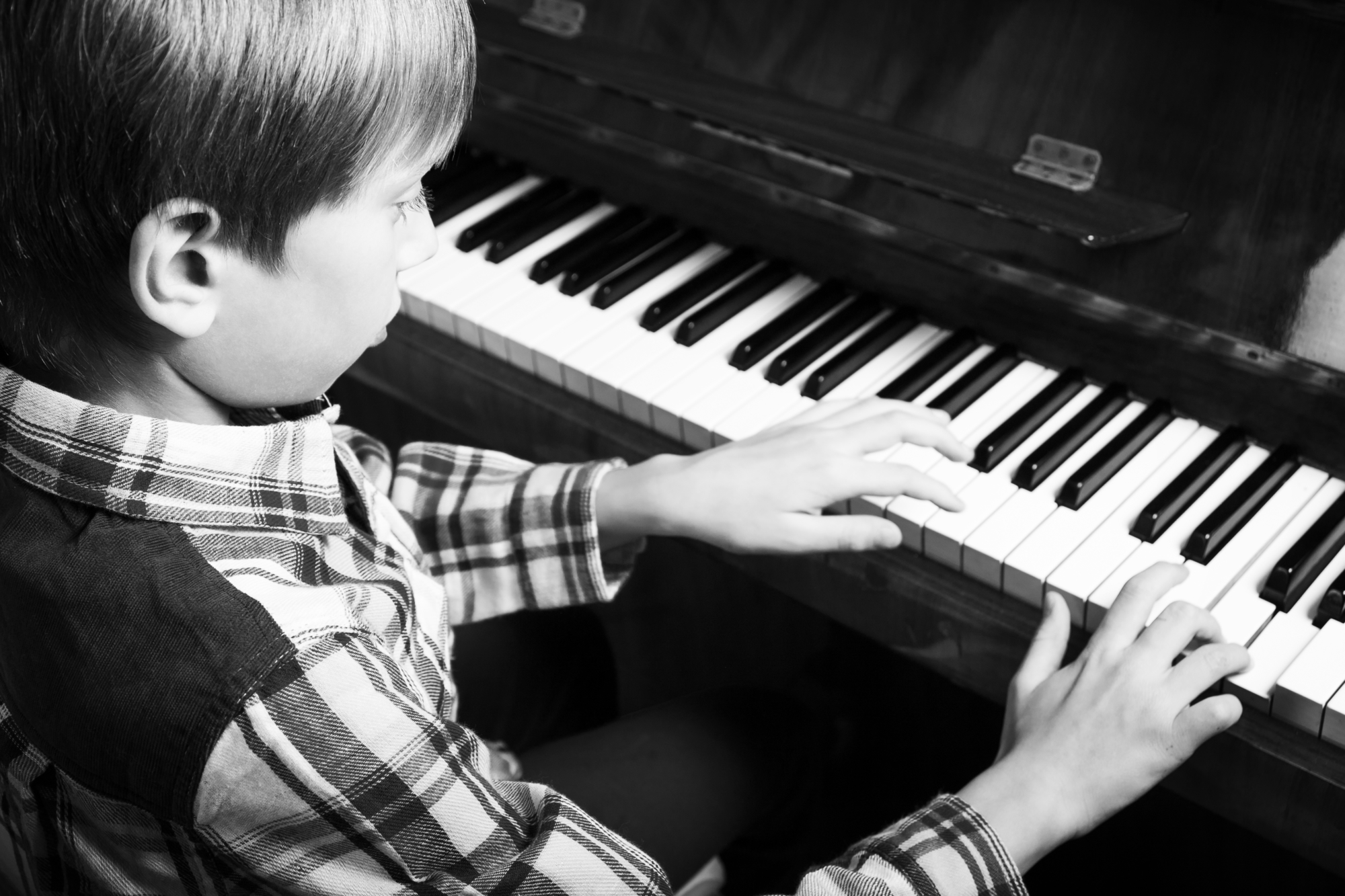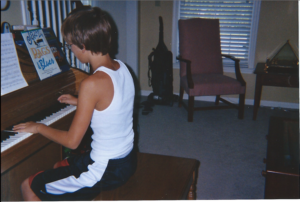
Imagine if you could go back in time and tell a younger version of yourself the future that is to come?
If I could go back in time and offer my younger musical self some serious advice, I probably wouldn’t have listened. Why? I knew what was best for me, and this was a result of me knowing everything and everybody else knowing nothing. Looking back, the reality was I didn't know much, and I’m not alone. A lot of adolescents experience these feelings too, and for some this ego will continue to dominate their mindset into their mid-20’s/30’s!
After really pondering, I concluded that my stubbornness was a combination of puberty, immaturity, personal insecurities, and impatience. Although I have grown tremendously since I was 14, I believe if I could go back in time and alert myself to some realities, and of course convince myself to trust me, the journey would have been a bit easier up until this point. If you are a young musician, regardless of age, I would really recommend considering some of the advice I wish I could tell myself, and implement it. We are going to go in order from most important, to still important, but not as easy to control.
1. Learn your Scales and Arpeggios
I know, I know--practicing scales and arpeggios is not the most interesting task, and honestly, it can be rather uninspiring. This is primarily due to the difficulty when you first start, and overall time consumption required for the study. However, if you really want virtuosity on the keyboard, the way I craved it when I was younger, then sit down, and begin to study the two basic fundamentals: scales and arpeggios. Everything in your musical life will become easier once you acquire these skills.
How do scales and arpeggios help?
Studying scales and arpeggios offers us many skills: evenness in our playing, flexibility in our wrists, independence of our fingers, and strength in our hands, resulting in quality tone control, increased stamina, and faster speed. There is really no other practice that specifically helps in achieving all these qualities.
Technique
Carl Czerny (1791-1857), the piano virtuoso Franz Liszt (1811-1886)’s teacher, stated that the study of scales and arpeggios is greater than any technical study. Not to say that specific technical study isn’t necessary for mastery as well, but it does not offer the overall fundamental balance of scales and arpeggios.

Franz Liszt
I know, I know--there are so many scales and arpeggios, especially when we are in minor mode! Yet, the truth is without knowledge of these glorious scales and arpeggios, we will never grow into strong musicians. Think of this process like trying to write a book without really reading many books; sure, it’s still possible to have success as an author, after all creativity is really the main key when it comes to originality, but the probability is significantly lower. If you still aren’t convinced I ask you one question, why handicap yourself?
2. Listen to more music and transcribe
Aural Memory
The pieces you are trying to master right now, can you hear the whole piece in your head to the point where you can sing the whole piece? If not, you have not listened to it enough.
I really wish someone would have said this to me when I was younger. My teacher always told me to listen to the pieces I was studying, but never explained why. So naturally, as a know it all, I thought he was crazy and I could just figure out everything from the paper. Wrong!
The aural memory is our strongest memory bank as a musician. When we memorize a piece for performance, we can quickly forgot how to play the piece if we do not continue to actively study the piece. However, we generally do not forget how it sounds. So, if we continue to actively listen to and study the piece, thus making it so you can hear the piece in your head and sing what you hear outloud, then you can sit down at a piano and figure out what you are hearing. If this is new for you, it may take a little bit of time, but it will become quicker the more you do it.
Transcribing
When you listen to a song, especially in the pop genre, can you identify the harmonic progression just by listening to it? Can you figure out what the melody notes are according to the key? If not you need to transcribe more.
Transcribing is another way to practice these aural skills--and is more important than listening.
During my adolescent years, I was fortunate enough to realize the importance of learning music by ear, but I never took time to write it down, also known as transcribing. If you are going to learn music by ear, which I would highly recommend, make sure to take time to write down the notes and rhythms. This will help solidify what you are hearing even more, and help your rhythm
3. Learn how to identify chords
When I was younger, I used to stare at the keyboard, and it just looked so alien to me. Although I knew how to play it, I didn't really understand much about it. This all began to change when I took the time to learn my chords.
C Major, D Minor, E7, F Major b9, G Minor 7 b5, A Major b13, B Minor #11…. ect.
These are just a few chords and if you are scratching your head this is a great place to begin. After I finally began understanding these chords, my whole life started to change. I started to recognize these chords used throughout all music, regardless of genre, and in result it hit me. Music is music, it's all the same.
It doesn’t matter if you are playing Classical, Jazz, Rock, Latin, Pop, Broadway, EDM… the basic harmonic principals are the same. Once you understand your chords, harmonic function will become so much more simple. Then you can began exploring all the different styles of music, and eventually you’ll realize the only difference in music is just the style, not the fundamental principles.
4. Don’t throw away compositions!
When I was 16, I wrote a composition that I was extremely proud of. I played it for everyone, and it received praise. The piece was extremely simple. It only consisted of four chords, but I had a little bit of skill on the keyboard at the time, so I was able to spice it up and make it nice and Romantic.

Finally, I got the courage to play it for my piano teacher. Now keep in mind, my piano teacher was extremely demanding, knowledgeable (for better or worse), and wasn’t easy to impress. But, the praise I received from my family and friends inspired the confidence to perform it for him. When I did, he looked at me and said, “you know, this isn’t real music. It's just four chords, like the garbage you hear on the radio. Don’t get me wrong, it's nice, but it shows you don’t have any compositional skill.”
This devastated me. I fought with the piece for days, trying to make it more harmonically complex, but I didn't know anything about harmony at the time. I was writing purely by my ear (for better or worse), and it’s true, at the time I really only listened to Rock and Pop. So what did I do? I threw it away.... Or maybe I put it in the shredder? I’m not exactly 100% sure how I disposed of it, but it's undoubtedly gone.
Don’t do this! I really regret it. So much so I actually tried searching for it pretty recently. It was a moment of denial that I would actually be foolish enough to allow myself to be so persuaded by just one measly opinion.
First of all, news flash Steve, the human ear has reached a point in our history where the simpler the music, the better. What was my teacher was really trying to say? I needed to add all this crazy harmonic complexity to be approved by the “council of genius musicians.” That's just nonsense.
Don’t allow someone, who has their ear stuck in the 17th century, to convince you that you are beneath them. Honestly, the simpler your music, the better! The reality is my four chord piece was a great piece for the 21st century that made the few people who heard it, much happier during that moment. If your composition moves just one person, it’s worth it.
So remember my advice: if you like it, believe in it, and have a great time playing it, others will feel the same way. Don’t forget that there will always be people who don’t like your art and those who will hate just to hate. Do not allow pessimistic “music scholars” to phase your own opinion.
5. Stop being so upset because you aren’t “the best”
My last piece of advice is to stop being so upset at myself for not being “the best,” and to stop comparing myself to the 11 year old child prodigy who just took gold in a major competition. This is a waste of energy, and a distraction from progression.
When I was an adolescent I was so jealous of all the genius child prodigies I would hear about, or watch on youtube. “Why can’t that be me?” Is something I would say, over and over again. Huge sign of immaturity and insecurity. Also, I just didn't practice enough! Duh!
To top it all off, the teacher I studied with had a child prodigy as a student, and during the recitals I would just play one movement from a sonata, that had mistakes; meanwhile he would be performing a whole sonata, mistake free, and you could really feel his focus in the audience. I would get freaked for days that he would get the job before me or beat me in a competition, when in fact a few years later he would no longer be competition to anyone.
What happened? He went on to become a surgeon--truly a genius! All that worrying for nothing! Also, as an ignorant, self-obsessed teenager, I failed to realize that all those young prodigies I saw on TV, Youtube, and Social Media, weren’t competition to me either. They had either already won the competition or their career is already beginning to be established. Odds are you will never encounter them in your life, and in a few years, never hear about them again.
Because music study requires so much time and discipline it can be easy to fall into the trap that you are not good enough. All of these thoughts above turned out to be nonsensical, and held me back at the time. All of that distraction and pessimistic thoughts resulted in me barely practicing for years. Stay positive.
So remember: Scales are your best friend, listen to the pieces you are studying relentlessly, learning all your chords is pretty cool, and you are bound to get more praise, and money for that matter, with a piece that is simpler to ear.
I know that practicing all the time can become such a lonely experience, and it doesn’t help that we are constantly comparing ourselves to those who we perceive to be better than us. Don’t get mad about the fact that you aren’t the fastest or most perfect musician out there, Steven. Instead embrace and accept this.
Focus when you practice! Learn from your errors, the same way you have learned so much throughout life. Rather than being discouraged by that child prodigy, become friends with him/her. You know the amount of dedication that is required to achieve that skill level. Stop being so self centered and come to realize he/she is probably just as lonely when practicing, has equal struggles in a different way, and can become a great friend both emotionally, and professionally.
Life has its days that are better than others. This holds true for piano playing, and all music playing as well.
Check out this video where I share my thoughts on practice from the perspective of jazz pianist & how to overcome challenges when learning new pieces.
